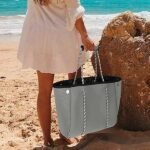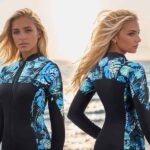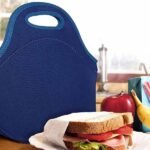Have you ever wondered what makes neoprene fabric so versatile and widely used? This unique material is not only durable and flexible but also waterproof and insulating, making it a popular choice across industries. Whether you’re considering neoprene for your next product line or just curious about its applications, this guide covers everything you need to know.
Neoprene fabric is used in a wide range of industries, including fashion, sports, healthcare, and automotive. Its water resistance, insulation, and durability make it a reliable material for various products, from wetsuits to laptop sleeves.
When I first started working with neoprene, I was amazed at its adaptability. Let’s delve deeper into its features and applications to understand why it’s such a preferred material.
What Is Neoprene Fabric?
Neoprene is a synthetic rubber material initially developed in the 1930s by DuPont. Over the years, it has become a staple in industries that require water resistance and flexibility.
Neoprene fabric is a synthetic rubber material known for its elasticity, water resistance, and insulating properties. It is created through the polymerization of chloroprene, resulting in a highly versatile fabric.
The versatility of neoprene lies in its ability to retain its shape and perform under extreme conditions. This is why it’s widely used for both functional and aesthetic purposes.
How Is Neoprene Made?
- Polymerization of Chloroprene: The process begins with chloroprene monomers being polymerized into polychloroprene.
- Foaming Process: Gas is added to create a sponge-like structure, resulting in a flexible and lightweight material.
- Lamination: The raw neoprene is often laminated with other fabrics like nylon or polyester for added strength and aesthetics.
What Are the Key Features of Neoprene Fabric?
Neoprene’s popularity stems from its exceptional properties that make it suitable for a wide range of applications.
Neoprene fabric is water-resistant, durable, flexible, and thermally insulating, making it ideal for products that require reliability under various conditions.
When I started manufacturing neoprene-based products, these features stood out as game-changers.
Key Features of Neoprene Fabric
| Feature | Description | Benefits |
|---|---|---|
| Water Resistance | Repels water, preventing absorption | Ideal for wetsuits, bags, and covers |
| Flexibility | Stretches without losing shape | Enhances comfort and usability |
| Thermal Insulation | Retains heat while blocking cold temperatures | Perfect for cold-weather gear |
| Durability | Resistant to wear, tear, and environmental factors | Long-lasting performance |
| Chemical Resistance | Withstands oils, chemicals, and UV exposure | Suitable for industrial applications |
These features make neoprene fabric a preferred choice in industries requiring performance and resilience.
How Durable Is Neoprene Fabric?
Durability is a crucial factor for any material, and neoprene excels in this area, making it a reliable choice for demanding applications.
Neoprene fabric is highly durable, withstanding wear and tear, environmental stress, and extreme temperatures. It maintains its integrity even with frequent use and exposure to harsh conditions.
I’ve seen neoprene products last years without significant degradation, even in challenging environments.
Factors Contributing to Neoprene’s Durability
Resistance to Physical Stress
Neoprene can endure constant stretching and compression without losing its elasticity. This makes it ideal for products like laptop sleeves and sports braces.
Weather Resistance
Unlike natural rubber, neoprene doesn’t crack or degrade when exposed to sunlight, rain, or extreme temperatures. This property is crucial for outdoor applications like diving gear and car seat covers.
Chemical Resistance
Neoprene is resistant to oils, greases, and some chemicals, making it a safe option for industrial applications.
Long-Term Performance
Products made from neoprene often outlast those made from traditional fabrics due to their superior resilience.
What Is Neoprene Fabric Commonly Used For?
Neoprene’s versatility makes it a go-to material for numerous industries. Its unique combination of properties allows it to be used in everything from protective gear to fashionable accessories.
Neoprene fabric is commonly used in sports equipment, fashion, medical applications, and industrial products. Its water resistance and durability make it a versatile material for diverse uses.
In my factory, we’ve produced neoprene products for clients across various sectors, highlighting its universal appeal.
Common Applications of Neoprene Fabric
Sports and Outdoor Equipment
| Product | Benefits |
|---|---|
| Wetsuits | Provides thermal insulation and water resistance |
| Gloves | Ensures grip and protects against cold |
| Knee/Elbow Braces | Offers compression and joint support |
Neoprene’s water resistance and flexibility make it a staple in sports and outdoor gear.
Fashion and Accessories
| Product | Benefits |
|---|---|
| Bags | Stylish yet durable; repels water |
| Shoes | Comfortable, lightweight, and weather-resistant |
| Jackets | Modern designs with thermal insulation |
Neoprene has gained traction in fashion for its sleek look and functional benefits.
Medical and Healthcare Products
| Product | Benefits |
|---|---|
| Orthopedic Braces | Provides support and compression |
| Neck Supports | Enhances recovery and comfort |
| Cold/Hot Therapy Wraps | Retains temperature effectively |
The healthcare industry values neoprene for its supportive and insulating properties.
Industrial and Automotive Use
| Product | Benefits |
|---|---|
| Seals and Gaskets | Resistant to oils and chemicals |
| Car Seat Covers | Protects against wear and weather |
| Tool Pouches | Durable and weatherproof |
Neoprene’s strength and chemical resistance make it indispensable for industrial applications.
Conclusion
Neoprene fabric is a versatile, durable, and reliable material used across multiple industries. Its water resistance, thermal insulation, and flexibility make it ideal for a wide range of products, from sports gear to industrial applications.
At Szoneier, we specialize in custom neoprene fabric products tailored to your needs. Whether you’re a brand owner, wholesaler, or retailer, we offer high-quality manufacturing solutions to bring your designs to life. Contact us at info@neoprene-bag.com or visit our website at www.neoprene-bag.com to explore how we can support your business.











